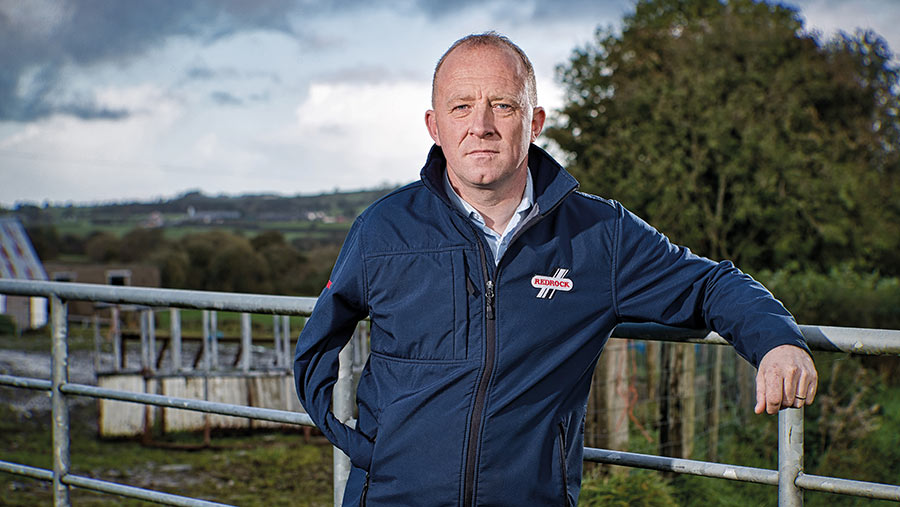Farmers Weekly launches campaign to make our industry safer
 © AdobeStock/Taras Rudenko
© AdobeStock/Taras Rudenko Growers and livestock producers are dicing with death on a daily basis – with half of all farmers saying they know someone killed in a workplace accident.
The stark statistic – uncovered by a Farmers Weekly survey – highlights the risks taken by farmers every day as they strive to put food on the nation’s plates.
One in five respondents admitted to having had a workplace accident within the past year.
See also: Farm deaths double in 12 months, reveal latest statistics
The study was undertaken to mark the launch of Dying to Feed You – a groundbreaking campaign to reduce the number of accidents on UK farms and a fatality rate which makes agriculture the country’s most dangerous industry.
Starting this week, the initiative is being run by Farmers Weekly in partnership with farm safety experts Safety Revolution. It will highlight the risks taken by farmers and farmworkers – and how they can be avoided.
Farming has the worst fatal accident rate of all the main UK industries – some 20 times higher than the all-industry average, according to the Health and Safety Executive.
Over the next 12 months, we will share the stories of farm accident survivors who have been brave enough to talk about their life-changing experiences – and help others stay safe on the farm and in the field.
Farmers Weekly editor Andrew Meredith said farmers and farmworkers were literally losing life and limb.
“We work in a dangerous industry, but it doesn’t have to be like that. Improving safety is not an impossible task. I’d like to thank every contributor to this important campaign.
“I hope this sparks a wider conversation about safety that is the first step towards reducing our accident rate.”
Unnecessary risks
Some 60% of Farmers Weekly survey respondents admitted to sometimes taking unnecessary risks – even though they knew doing so was wrong.
More positively, however, the remaining 40% said they never took risks while on the farm.
But farmers who admitted to being risk takers were eight times more likely to have had an accident than those who said they weren’t.
And livestock producers were more likely to have had an accident than arable farmers.
Risks included operating machinery knowing it was unsafe (25%), getting on or off a moving vehicle (25%), carrying out machinery while it was still running (26%) and driving a tractor while on a mobile phone (52%).
Only 59% of respondents said they had attended a first aid or safety training course during the past two years. And only one in three farmers said they always kept a written record of workplace accidents – despite being required by law to do so.
This is particularly concerning given that four out of five accidents required medical attention, with 44% needing a hospital visit, including 14% as an in-patient, says survey analyst Heather Macleod.
Cutting corners
“Men were more likely than women to take risks,” she says. “We gave all respondents the reassurance that their responses were confidential and about one in four were happy to say they knowingly take unnecessary risks.”
When it came to livestock, one in four said they didn’t restrain cattle using proper handling facilities during treatment – an alarming percentage given the possible consequences.
And three in 10 said they sometimes or often worked in a pen with a loose bull.
Oliver Dale of campaign partner Safety Revolution said the real percentage was likely to be higher. “A lot of farmers say to me their own bull is docile – but everyone knows that bulls can flip at a moment’s notice.”
About half of respondents said they had worked at height on a ladder which was not footed, with only 45% using a cherry-picker.
One in five said they had walked across an asbestos or tin roof without a roofing ladder.
Some 65% of those who had suffered a farm accident said the experience had changed their attitude to risk for the better. But one in four said it had made no difference, despite the impact of accidents on mental health (13%) and family relationships (8%).
Accidents cost farm businesses thousands of pounds
Farm businesses are losing thousands of pounds due to avoidable workplace accidents, the survey reveals.
One in four farmers or farm employees who suffered an accident said they needed at least a day off work. The typical accident saw people signed off for 11 days – but in the worst cases, 12% required a month or more off work.
“Some respondents had much more time off work than that,” says survey analyst Heather Macleod. “One person was off work for more than six months and another was off for more than a year. In the worst cases, people never return to work again.”
Oliver Dale, of campaign partners Safety Revolution, says the reality is likely to be far worst than the survey findings suggest.
“Many people are unaware of what counts as a near-miss,” explains Mr Dale. “And until it happens, they don’t realise that a substantial number of incidents lead to a significant time off work – and there is a substantial cost to that time.
“Often incidents happen at the busiest times of year – when farms can least afford to have a person off work.”
Almost one in five farmers said they had experienced at least one near-miss incident on the farm in the past 12 months. Where an accident did occur, the most likely injuries involved bruising, laceration or being crushed.
Younger people were more likely to have narrowly avoided injury than older respondents. Near-misses were also higher for those respondents who admitted to being risk-takers – although experts again think such incidents are underreported.
Autumn inspections seek to improve farm safety
Farms across six English counties and South Wales face health and safety inspections this autumn amid a renewed drive to target unsafe working practices.
Health and Safety Executive inspectors will visit farms in Bedfordshire, Buckinghamshire, Cumbria, Hertfordshire, Lancashire and Oxfordshire – as well as various locations in South Wales – as they seek to reduce the number of workplace accidents.
A similar series of inspections took place before the Covid pandemic in Yorkshire, the Midlands, north-east and south-east England and Scotland. A sample of those farms will be revisited in early 2022 to see if there has been any improvement.
It follows a year that saw the number of fatal accidents more than double on UK farms. Some 46 people lost their lives in the year to March 2021 – including seven members of the public – compared to 21 fatalities during the previous 12 months.
Commenting on those statistics, HSE acting head of agriculture Adrian Hodkinson said: “When we investigate life-changing farm workplace incidents, we find, time and time again, that risks are not being removed or managed.”
Urging people to stay safe, Mr Hodkinson said simple actions could reduce the number of farm accidents: “It is far too common for people to accept risk as an inevitable part of the job – but this isn’t the case.
“It is not acceptable that agriculture continues to fail to manage risk in the workplace. We need everyone to play their part to change their own behaviours, do things the right way and ‘call out’ poor practices.”
‘Culture shift’ needed
Farming families are being urged to redouble their efforts and help reduce the number of workplace accidents in agriculture.
The call was made by NFU deputy president Stuart Roberts, who is chairman of the Farm Safety Partnership – a cross-industry group of more than 35 organisations, including Farmers Weekly, working to improve farm safety.
In 2018, the partnership set a target of halving the number of fatal farming accidents within five years. But the rate has risen sharply, rather than going down, with almost one person a week killed on UK farms last year.
Mr Roberts said there had been a disappointing lack of progress in addressing farming’s poor health and safety record. People were taking unnecessary risks which in the worst cases resulted in their deaths.
“We are yet to see the fundamental culture shift needed to prevent the catastrophic injuries and loss of life we see every week in our industry. There are no shortcuts: we must redouble our efforts if we are to make impactful, long-term change,” he said.
Life-changing injuries leave farmers in constant pain
Some 7% of respondents to the Farmers Weekly survey said they had suffered a life-changing injury as a result of a workplace accident.
Many of those respondents said they remained in constant pain or were still undergoing medical treatment. Respondents were more likely to be older farmers.
“I broke three bones in my back. It leaves me with back pain every day – especially when driving the tractor or other machines.” Male, 55-64 years old
“I’m unable to walk as well as I used to. I’m in constant pain.” Female, 45-54 years old
“Almost a year after my accident, I am still in a lot of pain in my legs and neck.” Male, 55-64 years old
“A year on, and I’m still going into hospital to find out how much damage there is to my neck, knees and shoulders. Male, 55-64 years old
Case study: Childhood accident

William Sayers © Richard Stanton
A dairy farmer’s son who lost his arm in a farm accident is urging other people in agriculture to stay safe – and take extra care at work.
William Sayers was just 12 years old when his arm was torn off at the shoulder.
It happened when his coat became caught in a PTO shaft spinning at 400rpm while driving a vacuum pump on the back of his father’s tractor.
See also: Farm fatalities double in 12 months, reveal latest statistics
“It’s not just for a day – it’s life changing,” he told Farmers Weekly.
“When I looked at myself in the mirror I was unrecognisable,” said Mr Sayers, explaining how he woke up in intensive care.
“It was me, but not as I remembered myself. I was so badly bruised – and with an arm missing.”
Safety campaign
The accident left Mr Sayers lucky to be alive but unable to take on the running of the family farm.
More than 30 years later, he now works in tractor sales for D&M Farm Services in the village of Eglinton, County Londonderry.
Mr Sayers spoke out to support the launch of a Farmers Weekly campaign to reduce the number of fatal farm accidents.
Over the next 12 months, we will highlight the stories of 12 farm accident survivors – and how they have rebuilt their lives.
In doing so, we hope to encourage safer working practices on farms across the UK.
Called Dying To Feed You, the year-long campaign, in partnership with farm safety experts Safety Revolution, will also highlight to consumers the sometimes fatal risks taken to put food on their plates.
Dying to Feed You
 About the campaign
About the campaign
Farming has the highest number of workplace fatalities of all occupations. Farmers Weekly is pledging to use its voice, influence and reach to reduce the accident rate in agriculture.
Find out how you can be a part of helping us change agriculture’s safety record at fwi.co.uk/dying-to-feed-you
Partner message

The team at Safety Revolution are delighted to be working with Farmers Weekly to reduce deaths in agriculture and to show how we can work together to create safer farms.
Building strong and positive safety cultures delivers happy and safe teams, fewer incidents and improved productivity. We look forward to exploring individual case studies and shining a light
